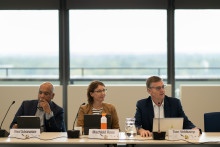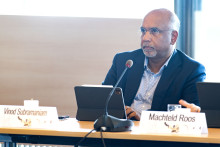Concerns about waiting time student psychologists
Student party UReka voiced its concerns about the long waiting lists at the UT’s student psychologists. According to the council member Imke Verschuren, the waiting time is now close to three months. She stressed that it’s important that everyone is helped in a reasonable timeframe. ‘Especially in urgent situations, a student should be seen within a few days instead of a few weeks’, said Verschuren.
Rector Tom Veldkamp responded that the Student Affairs Coaching & Counselling office is currently in the process of hiring two extra student psychologists. ‘We’re investing more in student psychologists, with money from the quality agreements – that is a decision we made based on the input of students. This summer, a new head of the group will also be appointed, who will specifically be tasked with evaluating and dealing with peak pressure. Besides, I want to emphasize that for emergency cases, it is possible to have an appointment within days. The main problem, however, remains identifying the sense of urgency.’
More clarity about Twente Pathway College next year
Based on findings and conclusions in the midterm evaluation report of Twente Pathway College (TPC), the University Council asked the Executive Board for some commitments: to provide a more comprehensive quantitative analysis of the enrolment and study success of the last three cohorts of TPC students, a more extensive long-term evaluation and an education-driven vision on Twente Pathway College, with a plan for educational improvements. Besides, the council wants TPC to better align with the Twente Education Model, the UT culture and the Dutch culture.
Executive Board President Vinod Subramaniam assured that the quantitative analysis will be available soon. However, he did not agree that the UT should have another extensive evaluation of Twente Pathway College – since the term between the UT and Navitas ends on 31 August 2024 and there is also an ongoing discussion about so-called foundation years at a national level. ‘That’s why we need to decide in 2023 whether or not to continue with this. By then, we will have all the qualitative and quantitative information to make this decision.’
While the council stressed the need to have clear objectives and boundaries to make this decision, Subramaniam stressed that it’s important to give the Twente Pathway College room for improvement. ‘The boundaries are clear already and included in the evaluation – which we just had. So let’s first work on this. We also want to see clear changes, since we are deeply involved as a university. That’s why we want to make sure that curriculum development team is looking at improvements.’
English language requirements
The University Council and the Executive Board had a more in-depth discussion about the English language requirements for international students. Click on the link below to go to our article.
Who’s the boss?
Following the recent critical evaluation of University College Twente, the University Council also raised concerns about the governance of so-called ‘in-between faculty activities’. Specifically independent, university-wide initiatives that are embedded in a faculty, like University College Twente, the Honours Programme, the DesignLab, Pre-U and NanoLab.
Who is responsible for monitoring the needs and performances of these independent programmes, that was the main question of the council. Council chairman Herbert Wormeester noted that he spoke to several members of faculty councils, who have never seen any documents from these independent programmes. ‘So if you say that a faculty is responsible, then a faculty has to get regular updates on how things are going. Currently, those conversations only take place on an incidental basis, but it’s not part of the governance structure. Sometimes, faculty councils aren’t even aware that they are responsible.’ Council member Atis Kazaferi added: ‘We also have to keep the difference between strategical and operational needs in mind. In any case, the programmes should feel prioritized, and not fall between the cracks.’
Rector Tom Veldkamp stressed that the University Council itself is the place to discuss matters of strategic importance. ‘And I will make sure to point out to faculty councils that they have their respective responsibilities.’ The council wanted to make the governance structure more explicit. President Vinod Subramaniam, however, sees potential in a cultural shift. ‘What you’re pointing out is true ownership. When a programme is embedded, that’s a cultural thing. It’s not just a paper reality, it’s also about how you deal with it and truly feel responsible. That’s what we should strive for.’







